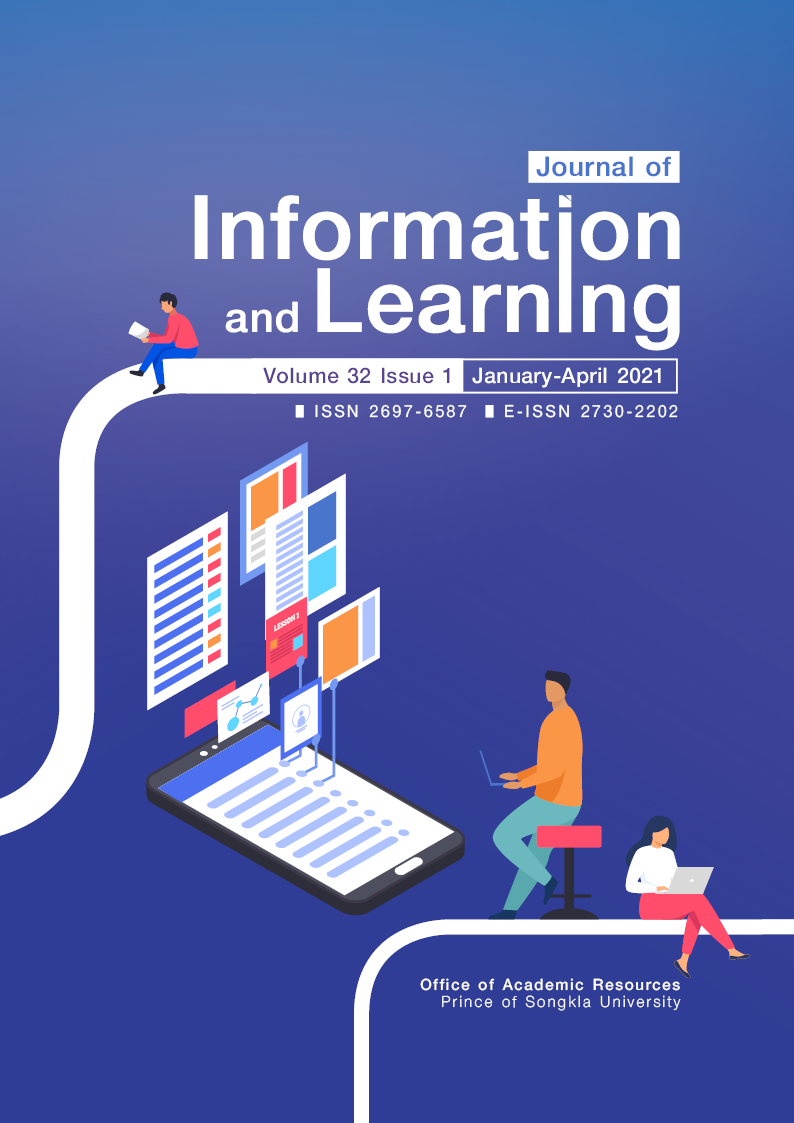Effects of Using Self-Directed Learning on the Internet on Knowledge and Self-Care Ability in Patients Undergoing Coronary Artery Bypass Graftin
Main Article Content
Abstract
The purposes of this research were to study the effects of self-directed learning on the Internet on knowledge and self-care ability in patients undergoing coronary artery bypass grafting. The sample was composed of 51 patients who underwent surgery for the first time. Research instruments were video media, pre-operative and pre-discharge knowledge questionnaires. Data were collected by before and after self-directed learning with video media on the internet, 1-month post-operative self-care ability questionnaires. Data were analyzed by using mean, SD and paired t-test for the difference between of knowledge before and after self-directed learning on the internet.
This research revealed that the knowledge after self-directed learning on the Internet mean scores were significantly higher than those before self-directed learning (p<0.001) in both of pre-and post-operation, well 1-month post-operative self-care ability mean scores were significantly (p<0.001).
It can be concluded that self-directed learning with video media can enhance knowledge and self-care ability. It can be suggested that healthcare teams should adopt this technique for the benefit of patients.
Article Details

This work is licensed under a Creative Commons Attribution-NonCommercial-NoDerivatives 4.0 International License.
The Journal of Information and Learning is operated by the Office of Academic Resources, Prince of Songkla University. All articles published in the journal are protected by Thailand copyright law. This copyright covers the exclusive rights to share, reproduce and distribute the article, including in electronic forms, reprints, translations, photographic reproductions, or similar. Authors own copyrights in the works they have created as well as the Office of Academic Resources. The Journal reserves the right to edit the language of papers accepted for publication for clarity and correctness, as well as to make formal changes to ensure compliance with the journal's guidelines. All authors must take public responsibility for the content of their paper.
References
Bandura, A. (1997). Self efficacy: The exercise of control. New York: W.H. Freeman and Company.
Bergvik, S., Wynn, R., & Sorlie, T. (2008). Nurse training of a patient-centered information procedure for CABG patients. Patient Education and Counseling, 70(2), 227-233.
Cebeci, F., & Celik, S. S. (2008). Discharge training and counselling increase self-care ability and reduce postdischarge problems in CABG patients. Journal of Clinical Nursing, 17(3), 412-420.
Chen, J. O., Liu, J. F., Liu, Y. Q., Chen, Y. M., Tu, M. L., Yu , H. R., Lin, M. C., Lin, C. C., & Liu, S. F. (2018). Effectiveness of a perioperative pulmonary rehabilitation program following coronary artery bypass graft surgery in patients with and without COPD. Int J Chron Obstruct Pulmon Dis., 16(13), 1591-1597. Retrieved from https://pubmed.ncbi.nlm.nih.gov/29805258
Curran, V., Fleet, L., Simmons, K., Lannon, H., Gustafson, D. L., Wang, C., Garmsiri, M., & Lyle, W. (2019). Adoption and use of mobile learning in continuing professional development by health and human services professionals. The Journal of Continuing Education in the Health Professions, 39(2), 76-85. Retrieved from https://pubmed.ncbi.nlm.nih.gov/30908401
Department of Cardiovascular-Thoracic Surgery Outpatient, Rajavithi Hospital. (2018). The statistical number of coronary artery bypass grafting patients. Bangkok: Rajavithi Hospital.
Department of Technology and Information, Rajavithi Hospital. (2017). Statistical report 2017. Retrieved from http://www.rajavithi.go.th/rj/wp-content/uploads/2019/02/stat2560.pdf
Epidemiology Division, Department of Disease Control, Ministry of Public Health. (2019). Coronary Artery Disease (CAD). Retrieved from https://ddc.moph.go.th/uploads/files/1081120191227084415.pdf
Goodman, H., Parsons, A., Davison, J., Preedy, M., Peters, E., Shuldham, C., ...Cowie, M .R. (2008). A randomised controlled trial to evaluate a nurse-led programme of support and lifestyle management for patients awaiting cardiac surgery 'Fit for surgery: Fit for life' study. European Journal of Cardiovascular Nursing, 7(3), 189-95.
Ma, L., Deng, L., & Yu, H. (2020). The effects of a comprehensive rehabilitation and intensive education program on anxiety, depression, quality of life, and major adverse cardiac and cerebrovascular events in unprotected left main coronary artery disease patients who underwent coronary artery bypass grafting. (Randomized Controlled Trial). Irish Journal of Medical Science, 189(2), 477-488. Retrieved from https://pubmed.ncbi.nlm.nih.gov/31758523
Mansin, A., Lerdkittikulyotin, S., Lerttraikul, N., Asdornwised, U., Thanakiatpinyo, T., & Tantiwongkosri, K. (2016). The effect of education program on knowledge and self-care ability in patients undergoing coronary artery bypass grafting. Journal of Nursing Science, Mahidol University, 34(1), 17-26.
Mohsenipouya, H., Majlessi, F., Forooshani, A., & Ghafari, R. (2018). The effects of health promotion model-based educational program on self-care behaviors in patients undergoing coronary artery bypass grafting in Iran. Electron Physician, 10(1), 6255-6264. Retrieved from https://pubmed.ncbi.nlm.nih.gov/29588828
Prado-Olivares, J., & Chover-Sierra, E. (2019). Preoperatory anxiety in patients undergoing cardiac surgery. Diseases, 7(2), 46. doi: 10.3390/diseases7020046
Ruggeri, K., Farrington, C., & Brayne, C. (2013). A global model for effective use and evaluation of e-learning in health. Telemedicine Journal and e-Health, 19(4), 312-321.
Savci, S., Degirmenci, B., Saglam, M., Arikan, H., Inal-Ince, D., Turan, H. N., & Demircin, M. (2011). Short-term effects of inspiratory muscle training in coronary artery bypass graft surgery: a randomized controlled trial. Scandinavian Cardiovascular Journal, 45(5), 286-293.
Scott, K. M., Baur, L., & Barrett. J. (2017). Evidence-based principles for using technology-enhanced learning in the continuing professional development of health professionals. The Journal of Continuing Education in the Health Professions, 37(1), 61-66. Retrieved from https://pubmed.ncbi.nlm.nih.gov/28252469/
Sorlie, T., Busund, R., Sexton, J., Sexton, H., & Sorlie, D. (2007). Video information combined with individualized information sessions: effects upon emotional well-being following coronary artery bypass surgery-A randomized trial. Patient Education and Counseling, 65(2), 180-188.
Stein, R., Maia, C. P., Silveira, A. D., Chiappa, G. R., Myers, J., & Ribeiro, J. P. (2009). Inspiratory muscle strength as a determinant of functional capacity early after coronary artery bypass graft surgery. Archives of Physical Medicine and Rehabilitation, 90(10), 1685-1691.
Utiyaprasit, K., Moore, S. M., & Chaiseri, P. (2010). Recovery after coronary artery bypass surgery: effect of an audiotape information programme. Journal of Advanced Nursing, 66(8), 1747-1759.
World Health Organization (WHO). (2017). Cardiovascular diseases (CVDS). Retrieved from https://www.who.int/en/news-room/fact-sheets/detail/cardiovascular-diseases-(cvds)
Zarani, F., Besharat, M. A., Sadeghian, S., & Sarami, G. (2010) The effectiveness of the information-motivation-behavioral skills model in promoting adherence in CABG patients. Journal of Health Psychology, 15(6), 828-837.


